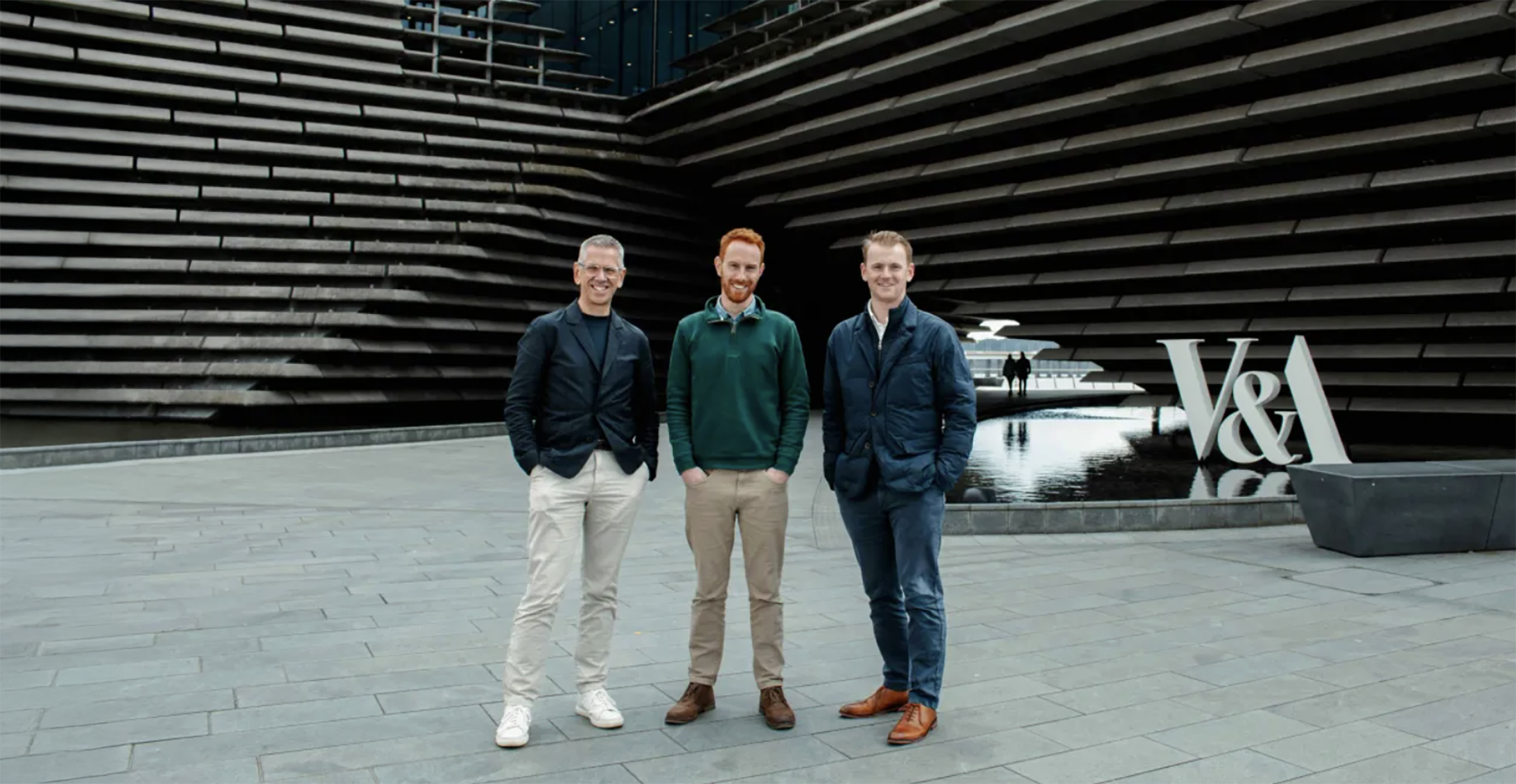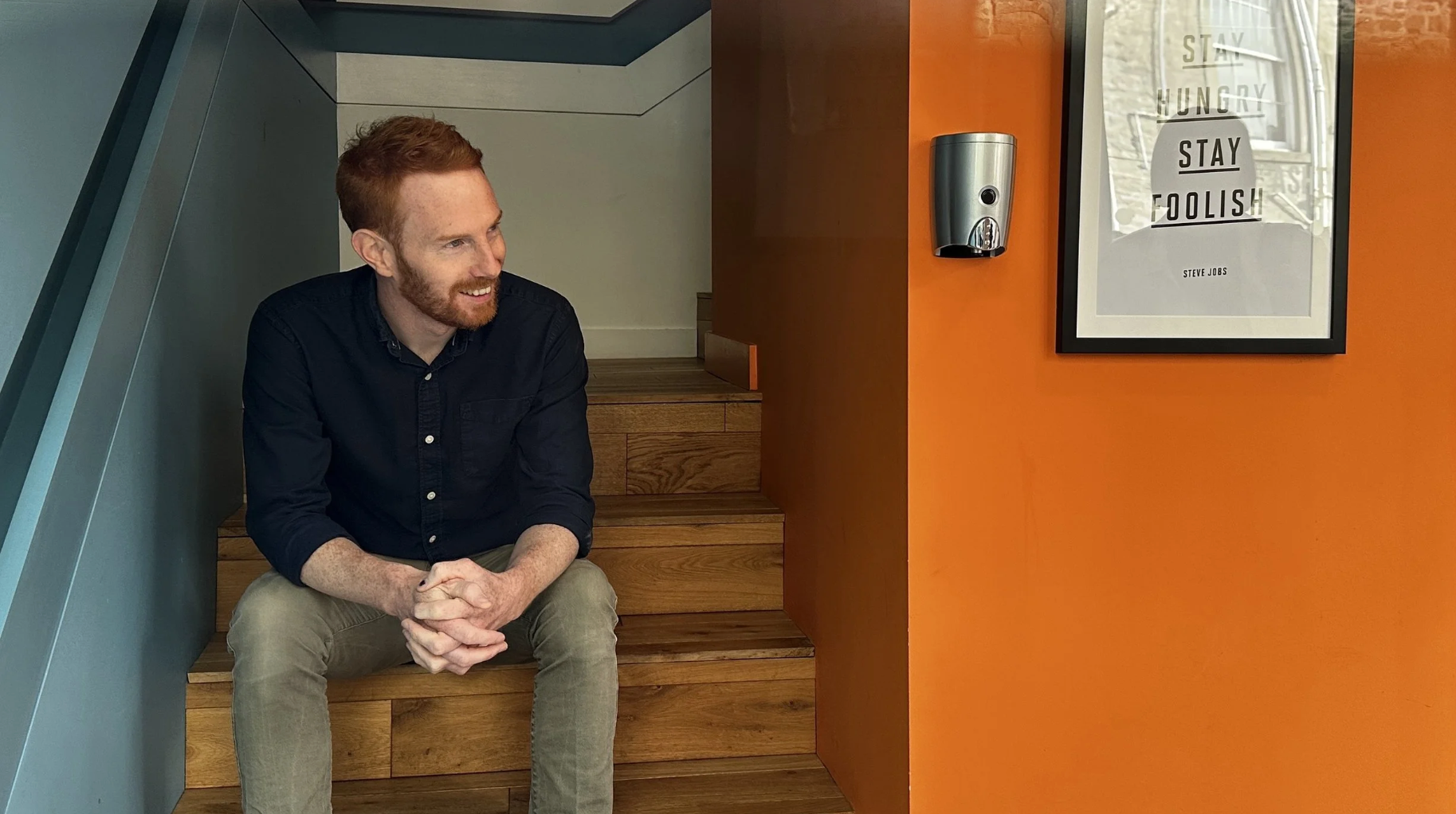MEET THE PRACTICE
‘We want to redesign accountancy’
Dundee-based Ashton McGill focuses on providing strategic support to SMEs looking to grow. Operations Director Jared Cordner CA explains why this ‘live design project’ goes way beyond transactions and compliance
Words: Fraser Allen

Jared Cordner CA’s job title isn’t one frequently encountered in accountancy firms. But listening to the Operations Director at Ashton McGill, it’s clear his role isn’t the only unusual thing about the practice.
“Around 50% of our revenue comes from non-compliance work – reporting, insights, strategic input,” says Cordner (above, centre, flanked by Alasdair McGill, left, and his son Andy, right). “It’s a recurring retainer model – not CFO level, but more involved than traditional compliance. We pitch the right level of service to the right type of client. It’s not about being everything – it’s about being really good at what’s needed.”
Dundee-based Ashton McGill is one of a growing number of practices specialising in in-depth advisory work for clients – see also McMillan Grubb, profiled in the September issue. A limited company rather than a partnership, Ashton McGill also has a strong emphasis on mission and culture, and a focus on data, technology and AI. All in all, it’s just the sort of practice that Cordner hoped to join when he embarked on his career, but struggled to find until his second spell on Tayside.
His story began on the north coast of Northern Ireland, where he grew up close to the famous Royal Portrush golf course. And while he didn’t entertain any career plans as a boy, there was clearly an enterprising spark at play.
“As a child, I loved the freedom of doing things – starting bands, football teams, business ideas,” he says. “I’ve always immersed myself in whatever interests me and tried to make things happen. I guess I was always quite entrepreneurial but it’s only in retrospect that I was able to see some of those strands continuing into adult life.”
However, by the latter half of secondary school, the global banking crisis was on the horizon and Cordner felt he should choose a “proper” profession. “I was good with numbers,” he says. “So I chose accounting.”
After studying the subject at the University of Dundee, Cordner remained on Tayside as a CA trainee with Henderson Loggie. He describes his three years there as a “valuable foundation”, but at this point he was uncertain whether a career in accountancy was necessarily right for him. And having also got married, he and his wife Bex wanted to spread their wings.
“We moved to Uganda, where Bex worked in palliative care, and I supported charities with finance tasks,” he says. “It was a reset – a chance to reflect on what I really wanted to do. I didn’t know the term at the time, but I came to realise I wanted to work in an advisory role. I felt accountants had more to offer beyond compliance and transactional tasks.”
On returning to Northern Ireland, Cordner contacted several firms in Belfast to outline what he felt he could do, but none were set up to support the kind of work he was describing. Eventually, he joined a boutique consulting firm “where I saw how strategy and finance could merge”.
However, Cordner and Bex were keen to return to Dundee and, in early 2020, an opportunity arose with Ashton McGill. The firm was originally a service design company started by Alasdair McGill (Ashton is his wife’s maiden name). McGill trained as an accountant before developing a varied entrepreneurial portfolio – he is currently also Entrepreneur in Residence at the University of Dundee and part-time CFO of Dundee FC.
Front foot
The business changed direction when McGill’s son, Andy, persuaded his father that there was an opportunity for accountancy practices to be more proactive in supporting their clients. It was a shift to the sort of advisory role that Cordner had craved.
“The original problem was ‘how can small business owners better engage with their accountants?’” says Cordner. “Ashton McGill became the live design project to answer that. We only work with clients who meet us regularly – monthly or quarterly – and we build custom reporting structures to provide real clarity, not just data. Delivering a positive impact is central to everything we do. If a client is losing money, we don’t just tell them, we sit alongside them and figure out what to do about it.”
“There’s a growing space for accountants to act as advisers or fractional CFOs, especially for small businesses who can’t hire in-house expertise”
Cordner joined Ashton McGill just four days before the pandemic lockdown. “It felt like a gamble, but I believed in Alasdair and Andy, and I liked their vision for the accountant’s role,” he says. “They were good people with a strong vision, and I thought I was the right person to help them execute it. It’s been a brilliant fit.
“There’s a growing space for accountants to act as advisers or fractional CFOs, especially for small businesses who can’t hire in-house expertise,” he adds. “But it’s not enough to wake up and say ‘we’re now advisers’. You need to gain a deep understanding of your clients, their products or services and the challenges they face.”
Cordner’s role today is split 50/50 between working with clients and running operations – he leads recruitment, onboarding and process improvement. “I’ve got an appetite for doing things better,” he says. “Everything we do, I want to be simpler, more teachable, and more impactful.”
That includes harnessing the value of AI. “We’re having a critical look at the time we spend on non-client work, looking to take 80% of that time out by using AI in areas such as onboarding. We’re also using automation to streamline processes such as confirmation statements. There’s a piece of tech we have that scans Companies House daily and triggers a workflow if a client has a confirmation statement that is due. We’re also exploring how to use call records and industry data to build better client profiles and anticipate trends before meetings. It’s early days, but it’s promising.”
The Ashton McGill website proclaims: “We love small businesses – and it’s our mission to help them thrive.” There are now 14 people within the Ashton McGill team, and Cordner ensures they are aligned with that strapline in everything they do. “We want to redesign accountancy to make it a better experience for everyone – our team, our clients and our business,” he says. “That means improving lives, creating meaningful jobs and helping clients genuinely grow. Recruitment is a big focus now and I love creating great jobs. I want people to leave Ashton McGill able to get jobs they couldn’t get when they joined. That’s a real marker of success for me.”
Away from work, family life is a big priority for Cordner. “I adore being a dad to three daughters and love spending time with them – that’s where a lot of my energy goes outside work.”
And as well as being active in his local church, he is evangelical about his profession. “I spend a lot of time talking to friends and family about how being an accountant can be an amazing job,” he smiles. “And I’m happy to tell them, whether they ask or not!”
For more resources visit the ICAS practice hub
Jared Cordner CA’s job title isn’t one frequently encountered in accountancy firms. But listening to the Operations Director at Ashton McGill, it’s clear his role isn’t the only unusual thing about the practice.
“Around 50% of our revenue comes from non-compliance work – reporting, insights, strategic input,” says Cordner (above, centre, flanked by Alasdair McGill, left, and his son Andy, right). “It’s a recurring retainer model – not CFO level, but more involved than traditional compliance. We pitch the right level of service to the right type of client. It’s not about being everything – it’s about being really good at what’s needed.”
Dundee-based Ashton McGill is one of a growing number of practices specialising in in-depth advisory work for clients – see also McMillan Grubb, profiled in the September issue. A limited company rather than a partnership, Ashton McGill also has a strong emphasis on mission and culture, and a focus on data, technology and AI. All in all, it’s just the sort of practice that Cordner hoped to join when he embarked on his career, but struggled to find until his second spell on Tayside.
His story began on the north coast of Northern Ireland, where he grew up close to the famous Royal Portrush golf course. And while he didn’t entertain any career plans as a boy, there was clearly an enterprising spark at play.
“As a child, I loved the freedom of doing things – starting bands, football teams, business ideas,” he says. “I’ve always immersed myself in whatever interests me and tried to make things happen. I guess I was always quite entrepreneurial but it’s only in retrospect that I was able to see some of those strands continuing into adult life.”
However, by the latter half of secondary school, the global banking crisis was on the horizon and Cordner felt he should choose a “proper” profession. “I was good with numbers,” he says. “So I chose accounting.”
After studying the subject at the University of Dundee, Cordner remained on Tayside as a CA trainee with Henderson Loggie. He describes his three years there as a “valuable foundation”, but at this point he was uncertain whether a career in accountancy was necessarily right for him. And having also got married, he and his wife Bex wanted to spread their wings.
“We moved to Uganda, where Bex worked in palliative care, and I supported charities with finance tasks,” he says. “It was a reset – a chance to reflect on what I really wanted to do. I didn’t know the term at the time, but I came to realise I wanted to work in an advisory role. I felt accountants had more to offer beyond compliance and transactional tasks.”
On returning to Northern Ireland, Cordner contacted several firms in Belfast to outline what he felt he could do, but none were set up to support the kind of work he was describing. Eventually, he joined a boutique consulting firm “where I saw how strategy and finance could merge”.
However, Cordner and Bex were keen to return to Dundee and, in early 2020, an opportunity arose with Ashton McGill. The firm was originally a service design company started by Alasdair McGill (Ashton is his wife’s maiden name). McGill trained as an accountant before developing a varied entrepreneurial portfolio – he is currently also Entrepreneur in Residence at the University of Dundee and part-time CFO of Dundee FC.
Front foot
The business changed direction when McGill’s son, Andy, persuaded his father that there was an opportunity for accountancy practices to be more proactive in supporting their clients. It was a shift to the sort of advisory role that Cordner had craved.
“The original problem was ‘how can small business owners better engage with their accountants?’” says Cordner. “Ashton McGill became the live design project to answer that. We only work with clients who meet us regularly – monthly or quarterly – and we build custom reporting structures to provide real clarity, not just data. Delivering a positive impact is central to everything we do. If a client is losing money, we don’t just tell them, we sit alongside them and figure out what to do about it.”
“There’s a growing space for accountants to act as advisers or fractional CFOs, especially for small businesses who can’t hire in-house expertise”
Cordner joined Ashton McGill just four days before the pandemic lockdown. “It felt like a gamble, but I believed in Alasdair and Andy, and I liked their vision for the accountant’s role,” he says. “They were good people with a strong vision, and I thought I was the right person to help them execute it. It’s been a brilliant fit.
“There’s a growing space for accountants to act as advisers or fractional CFOs, especially for small businesses who can’t hire in-house expertise,” he adds. “But it’s not enough to wake up and say ‘we’re now advisers’. You need to gain a deep understanding of your clients, their products or services and the challenges they face.”
Cordner’s role today is split 50/50 between working with clients and running operations – he leads recruitment, onboarding and process improvement. “I’ve got an appetite for doing things better,” he says. “Everything we do, I want to be simpler, more teachable, and more impactful.”
That includes harnessing the value of AI. “We’re having a critical look at the time we spend on non-client work, looking to take 80% of that time out by using AI in areas such as onboarding. We’re also using automation to streamline processes such as confirmation statements. There’s a piece of tech we have that scans Companies House daily and triggers a workflow if a client has a confirmation statement that is due. We’re also exploring how to use call records and industry data to build better client profiles and anticipate trends before meetings. It’s early days, but it’s promising.”
The Ashton McGill website proclaims: “We love small businesses – and it’s our mission to help them thrive.” There are now 14 people within the Ashton McGill team, and Cordner ensures they are aligned with that strapline in everything they do. “We want to redesign accountancy to make it a better experience for everyone – our team, our clients and our business,” he says. “That means improving lives, creating meaningful jobs and helping clients genuinely grow. Recruitment is a big focus now and I love creating great jobs. I want people to leave Ashton McGill able to get jobs they couldn’t get when they joined. That’s a real marker of success for me.”
Away from work, family life is a big priority for Cordner. “I adore being a dad to three daughters and love spending time with them – that’s where a lot of my energy goes outside work.”
And as well as being active in his local church, he is evangelical about his profession. “I spend a lot of time talking to friends and family about how being an accountant can be an amazing job,” he smiles. “And I’m happy to tell them, whether they ask or not!”
For more resources visit the ICAS practice hub




